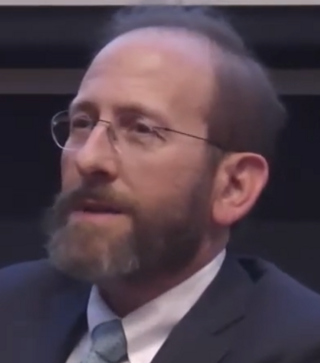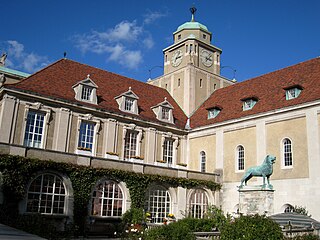Related Research Articles

The Atomic Cafe is a 1982 American documentary film directed by Kevin Rafferty, Jayne Loader and Pierce Rafferty. It is a compilation of clips from newsreels, military training films, and other footage produced in the United States early in the Cold War on the subject of nuclear warfare. Without any narration, the footage is edited and presented in a manner to demonstrate how misinformation and propaganda was used by the U.S. government and popular culture to ease fears about nuclear weapons among the American public.

The president of Harvard University is the chief administrator of Harvard University and the ex officio president of the Harvard Corporation. Each is appointed by and is responsible to the other members of that body, who delegate to the president the day-to-day running of the university.

Rakesh Khurana is an Indian-American educator. He is a professor of sociology at Harvard University, a professor of leadership development at Harvard Business School, and the dean of Harvard College.

Robert P. Kirshner is an American astronomer, Chief Program Officer for Science for the Gordon and Betty Moore Foundation, and the Clownes Research Professor of Science at Harvard University. Kirshner has worked in several areas of astronomy including the physics of supernovae, supernova remnants, the large-scale structure of the cosmos, and the use of supernovae to measure the expansion of the universe.

Quincy House is one of twelve undergraduate residential Houses at Harvard University, located on Plympton Street between Harvard Yard and the Charles River. The second largest of the twelve undergraduate houses, Quincy House was named after Josiah Quincy III (1772–1864), president of Harvard from 1829 to 1845. Quincy House's official counterpart at Yale University is Branford College.

The Harvard Undergraduate Council, Inc., colloquially known as "The UC," was the student government of Harvard College between 1982 and 2022, until it was abolished by a student referendum.
Francesca Harper is an American dancer and choreographer.

Claudine Gay is an American political scientist and academic administrator who is the Wilbur A. Cowett Professor of Government and of African and African-American Studies at Harvard University. Gay's research addresses American political behavior, including voter turnout and politics of race and identity.

Wai Ching Ho is a Hong Kong actress.
Georgia Sothern (1913–1981), born Hazel Anderson, was a burlesque dancer and vaudeville performer. She was known for her striptease performances. She gave an interview to The Harvard Crimson during a trip to the Old Howard Athenaeum in Boston during 1939. She toured New York Philadelphia, Boston, Buffalo, and Miami. She was a red-head. One of her performances was captured in a Film Theatarettes short film. She wrote her memoir titled Georgia: A Life in Burlesque. She had a series of marriages.
Lester Bernstein was an American journalist, newspaper executive, and the former editor-in-chief of Newsweek from 1979 to 1982.
During the Vietnam War, Harvard University was the site of a number of protests against both the war generally and Harvard's connections to the war specifically.
Harold Eliot "Hal" Krents was a blind American lawyer, author, and activist. He became known for the two movies based on his life: To Race the Wind, based on his autobiography, and Butterflies Are Free based on a play of the same name.
Robert M. Fogelson is an American urban historian. He is an emeritus professor of history at Massachusetts Institute of Technology.
Joshua Whatmough was an English linguist, professor, and writer from Rochdale, Lancashire who served as the president of the Linguistics Society of America in 1951. He was also the chairman of the department of linguistics at Harvard University from 1926 to his retirement in 1963. He studied comparative philology and classics at the University of Manchester and the University of Cambridge.
Nikki D. Erlick is an American writer.

The Minda de Gunzburg Center for European Studies (CES) is a center at Harvard University dedicated to the study, understanding, and promotion of European affairs and transatlantic relations. Founded in 1969, the center focuses on interdisciplinary scholarship in social, political, historical, and cultural dimensions of Europe. It has hosted notable political and scholarly personalities, established partnerships with institutions worldwide, hosted dozens of visiting researchers, and run programs, seminars, events, and issued publications.
Namhi Kim Wagner was a university instructor and Harvard University's first Korean Language Program Director. Her ceramics are influenced by Buncheong style and she is said to be one of the first American ceramicists to revive the Buncheong style of ceramics. Her work is in the Museum of Fine Arts, Boston's collection and the Harvard Art Museums' collection.
References
- ↑ Canby, Vincent (March 17, 1982). "DOCUMENTARY ON VIEWS ABOUT ATOM BOMB". The New York Times. ISSN 0362-4331 . Retrieved November 22, 2015.
- ↑ "The Atomic Cafe (1982) – IMDb". IMDb .
- ↑ Herman, Robin (May 16, 1982). "THEY TURNED OLD MOVIES INTO A TIMELY FILM ABOUT NUCLEAR WAR". The New York Times. ISSN 0362-4331 . Retrieved November 22, 2015.
- ↑ "CONELRAD: THE ATOMIC CAFE | Jayne Loader Interview [Fall 2002, Winter 2005]". www.conelrad.com. Retrieved November 22, 2015.
- ↑ Harrington, Richard (May 14, 1982). "'Atomic' Filmmakers: Trio With a Point of View". The Washington Post. ISSN 0190-8286 . Retrieved November 22, 2015.
- ↑ "Late Night With David Letterman: Show #0023". TV.com. Archived from the original on November 23, 2015. Retrieved November 22, 2015.
- ↑ "GROUND ZERO". Dallas Observer. Retrieved November 22, 2015.
- ↑ "Atomic Cafe" Producers on Late Night, March 10, 1982-YouTube
- ↑ "BETWEEN PICTURES by Jayne Loader | Kirkus Reviews". Kirkus Reviews. Retrieved November 22, 2015.
- ↑ Johnson, George (April 16, 1989). "New & Noteworthy". The New York Times. ISSN 0362-4331 . Retrieved November 22, 2015.
- ↑ "Picks and Pans Review: Wild America : People.com". www.people.com. Retrieved November 22, 2015.
- ↑ Silver, Allison (June 11, 1989). "Cross-Country Cartwheeling : WILD AMERICA AND OTHER STORIES by Jayne Loader (Grove Press: $17.95; 256 pp.)". Los Angeles Times. ISSN 0458-3035 . Retrieved January 31, 2016.
- ↑ Johnson, George (August 12, 1990). "New & Noteworthy". The New York Times. ISSN 0362-4331 . Retrieved November 22, 2015.
- ↑ ""Jeanne Dielman" by Jayne Loader". www.ejumpcut.org. Retrieved November 22, 2015.
- ↑ "Exposing the Rapist Next Door". www.nostatusquo.com. Retrieved November 22, 2015.
- ↑ "Jayne Loader'sPublic Shelter". www.austinchronicle.com. Retrieved November 22, 2015.
- ↑ "Pacing the Void #3- February 4". wc.arizona.edu. Retrieved November 22, 2015.
- ↑ "Pacing the Void #3/2- February 4". wc.arizona.edu. Retrieved November 22, 2015.
- ↑ Krieger, Todd (January 21, 1996). "A Videogame to Tempt The Sundance Cineastes". The New York Times. ISSN 0362-4331 . Retrieved November 22, 2015.
- ↑ "Newmedia Announces '96 Invision Awards". tribunedigital-chicagotribune. June 4, 1996. Retrieved November 22, 2015.
- ↑ "Interview – Jayne Loader | Mute". www.metamute.org. http://metamute.org. October 1997. Retrieved November 22, 2015.
{{cite web}}: External link in|publisher= - ↑ "Link-Lit From the Wench of Waxahachie". partners.nytimes.com. Retrieved November 22, 2015.
- ↑ "Todd E. Napolitano". www.altx.com. Retrieved November 22, 2015.
- ↑ "Jayne Loader". IMDb .
- ↑ Nichols, Peter M. (July 28, 1996). "For Some Directors, the Web Is Their Studio". The New York Times. ISSN 0362-4331 . Retrieved November 22, 2015.
- ↑ "CD-Rom against the bomb". The Independent. October 22, 2011. Retrieved November 22, 2015.
- ↑ "CD-ROM publishers 'have lost the plot'". Computerworld New Zealand. Retrieved November 22, 2015.
- ↑ "95–100 (PONG Festival)". www.brown.edu. Retrieved November 22, 2015.
- ↑ "MIC 9 art1". homepages.ihug.co.nz. Archived from the original on November 23, 2015. Retrieved November 22, 2015.
- ↑ "Rhizome". Rhizome. October 8, 1996. Retrieved November 22, 2015.
- ↑ "Full text of "What does woman want?"". archive.org. 1988. Retrieved November 22, 2015.
- ↑ "WEDDINGS; Jayne Loader, Robert Kirshner". The New York Times. December 12, 1999.
- ↑ "Kirshner Chosen As Quincy Master | News | The Harvard Crimson". www.thecrimson.com. Retrieved November 22, 2015.
- ↑ "Mascot-less, But Not For Long | Magazine | The Harvard Crimson". www.thecrimson.com. Retrieved November 23, 2015.
- ↑ "Quincy Students, Masters Mourn Loss of Poetic Pet | News | The Harvard Crimson". www.thecrimson.com. Retrieved November 22, 2015.
- ↑ "A Gym of Their Own | Opinion | The Harvard Crimson". www.thecrimson.com. Retrieved November 22, 2015.
- ↑ "Renovated Quincy Gym Opens | News | The Harvard Crimson". www.thecrimson.com. Retrieved November 22, 2015.
- ↑ "Set the mood, Quincy Style | Magazine | The Harvard Crimson". www.thecrimson.com. Retrieved November 22, 2015.
- ↑ "Crafted in Quincy, Alum Book Garners Praise | News | The Harvard Crimson". www.thecrimson.com. Retrieved November 22, 2015.
- ↑ "Nobel Talk Swirls at Fete For Quincy Master's Book | News | The Harvard Crimson". www.thecrimson.com. Retrieved November 22, 2015.
- ↑ "Elf Help | Magazine | The Harvard Crimson". www.thecrimson.com. Retrieved November 23, 2015.
- ↑ "Eco-Feminist Protests Male Meat Culture | News | The Harvard Crimson". www.thecrimson.com. Retrieved November 22, 2015.
- ↑ "Our Speciesist Culture | News | The Harvard Crimson". www.thecrimson.com. Retrieved November 22, 2015.
- ↑ "Making Up Valentine's Day | News | The Harvard Crimson". www.thecrimson.com. Retrieved November 22, 2015.
- ↑ "Office for Sustainability Spearheads Cosmetics Drive | News | The Harvard Crimson". www.thecrimson.com. Retrieved November 22, 2015.